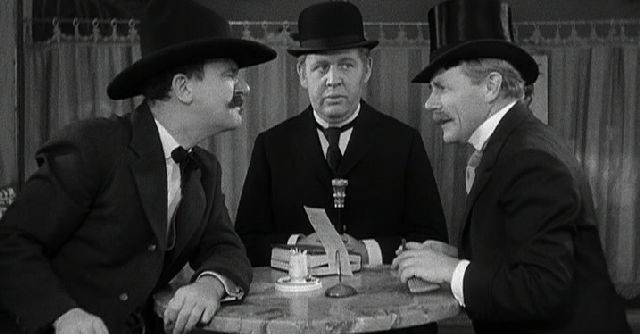Ruggles of Red Gap (1935) 
“SH-H-H-H! TONIGHT’S YOUR NIGHT TO HOWL! And howl you will at this funniest of all comedies..”

Ruggles of Red Gap (1935)
Director: Leo McCarey
Cast: Charles Laughton, Mary Boland, Charles Ruggles
Synopsis: An English valet brought to the American west assimilates into the American way of life.
Charles Laughton (The Canterville Ghost, Under Ten Flags) shows a pleasing comedic talent as the title character in Leo McCarey’s Ruggles of Red Gap. He plays it straight and understated, and barely moves his head left or right. Sometimes he makes you laugh simply by moving his eyes, and in the early scenes you can see that his carefully arranged poker face is concealing feelings of abject terror and confusion at the antics of his new masters.
Ruggles is a very proper Gentleman’s Gentleman whose ancestors have been serving the family of the dissolute Earl of Burnstead (Roland Young – King Solomon’s Mines) for generations. But the Earl loses him in a drunken game of poker with loud American oil man, Egbert Floud (Charles Ruggles – The Smiling Lieutenant, Trouble in Paradise), whose equally loud wife, Effie (Mary Boland), sees Ruggles as a means of impressing her socialite friends back in the Washington town of Red Gap. Naturally, Ruggles is distraught at the idea of leaving the Earl, but with typical British reserve, hides his feelings behind a face of stoic acceptance.
Although it can be viewed as a celebration of America’s habit of combining heart-on-their sleeve emotions with an overwhelming enthusiasm for life, as opposed to following a rigid path laid down by the social codes of a comparatively ancient imperialist society, the humour in Ruggles of Red Gap is so gentle that it’s impossible to be offended by any perceived slights aimed at the British. But just because it’s of a gentle variety doesn’t mean the movie’s humour isn’t laugh-out-loud funny at times. The first half, in particular, is filled with witty moments although it does lose its way in the final third as the humour temporarily gives way to US flag-waving. The lengthy recitation of Lincoln’s Gettysburg Address by Ruggles, which will obviously mean more to American audiences than to those from elsewhere, seems out of place and temporarily slows the pace to a crawl.
Laughton’s straitlaced delivery is impeccably timed, and perfectly complements the broad delivery of Ruggles and Boland, while Roland Young provides another rich source of laughs, particularly as he tries to woo attractive barkeeper Leila Hyams (Freaks) while playing the drums.
httpv://www.youtube.com/watch?v=6qqTZCWJLqY

